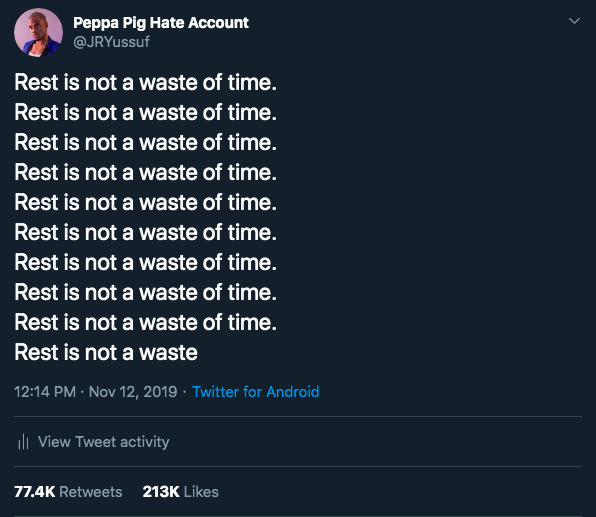I was taught from a very early age that I had to earn a good night’s sleep, that in order to be tired — physically, emotionally, or spiritually — it had to be justified, that one had to break one’s back, get the thing, sign the deal. Too often we are all told that sleep is a dead man’s game and that rest is a stint of the lazy. Get the degree, then the job, then the position, then the romantic partner, and then happiness will be yours.
But happiness does not work in the same way a 10-year plan does and cannot be an afterthought any longer. Thankfully, a lot has changed with my relationship with rest, and nowadays I turn to it to discover what I truly want, to work more efficiently and because it feels good. A huge impetus for this change was moving away from the idea that I am only as good as what I produce and that I am a worker in the machine before I am human. It has not been a linear journey, and I occasionally feel guilt for resting. I occasionally feel worthless if I take a day off, and I am not the only one.

A large part of why this tweet took off and spoke to so many people is because it is at direct odds with the framework so many of us work under and, even further, the tenets we learn to build our self-esteem upon. And yet it’s true. We know it’s true. Resting, not procrastinating, is not a waste of time. While you rest you recharge and gain the space to detach from the worldly things you’re taught are important. Finding the right balance between rest and work is largely about time management and working more efficiently rather than for longer periods of time.
Rest is both a right and a privilege in this society, and the contradictory nature of living under a capitalist society is one where humanity is both undercut and also the cornerstone of all enterprise. Finding time throughout the day to meditate, come home to myself, and refuse to multitask is how I make an attempt at remaining centered. It may not be by much, but I nudge the needle in any way I can.
Some of the immediate benefits to rest are stress reduction, having a renewed perspective on an issue and making your health and happiness a priority. Though many of us have busy lives, juggling multiple businesses and relationships it’s important to remember the relationship with ourselves is not only the most important, but also sets the precedent for all the others. When we continuously overextend ourselves, we set unhealthy parameters that may make us resentful in the long run and internalize the message that sacrifice of happiness in the present will get us closer to the happy future we envision. It will not.
I’ve come to know that putting off happiness to some allotted date in the future does not work, and that every job (or friend or romantic relationship) is not going to be a good fit, and the sooner I learn to be OK with that, the sooner I find some semblance of peace. Knowing when to say “I’ve gone as far as I’m willing to go,” and how to prioritize down time is so so vital.
Learning to center rest and in turn center yourself has unquantifiable value.


